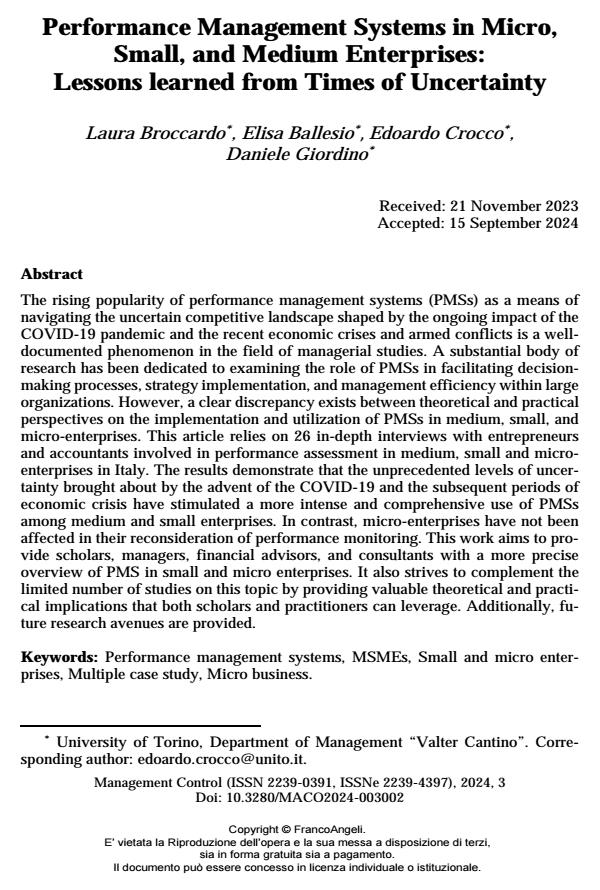Performance Management Systems in Micro, Small, and Medium Enterprises: Lessons learned from Times of Uncer
Titolo Rivista MANAGEMENT CONTROL
Autori/Curatori Laura Broccardo, Elisa Ballesio, Edoardo Crocco, Daniele Giordino
Anno di pubblicazione 2024 Fascicolo 2024/3
Lingua Italiano Numero pagine 24 P. 15-38 Dimensione file 392 KB
DOI 10.3280/MACO2024-003002
Il DOI è il codice a barre della proprietà intellettuale: per saperne di più
clicca qui
Qui sotto puoi vedere in anteprima la prima pagina di questo articolo.
Se questo articolo ti interessa, lo puoi acquistare (e scaricare in formato pdf) seguendo le facili indicazioni per acquistare il download credit. Acquista Download Credits per scaricare questo Articolo in formato PDF

FrancoAngeli è membro della Publishers International Linking Association, Inc (PILA), associazione indipendente e non profit per facilitare (attraverso i servizi tecnologici implementati da CrossRef.org) l’accesso degli studiosi ai contenuti digitali nelle pubblicazioni professionali e scientifiche.
The rising popularity of performance management systems (PMSs) as a means of navigating the uncertain competitive landscape shaped by the ongoing impact of the COVID-19 pandemic and the recent economic crises and armed conflicts is a well-documented phenomenon in the field of managerial studies. A substantial body of research has been dedicated to examining the role of PMSs in facilitating decision-making processes, strategy implementation, and management efficiency within large organizations. However, a clear discrepancy exists between theoretical and practical perspectives on the implementation and utilization of PMSs in medi-um, small, and micro-enterprises. This article relies on 26 in-depth interviews with entrepreneurs and accountants involved in performance assessment in medium, small and micro-enterprises in Italy. The results demonstrate that the unprecedent-ed levels of uncertainty brought about by the advent of the COVID-19 and the subsequent periods of economic crisis have stimulated a more intense and com-prehensive use of PMSs among medium and small enterprises. In contrast, micro-enterprises have not been affected in their reconsideration of performance moni-toring. This work aims to provide scholars, managers, financial advisors, and con-sultants with a more precise overview of PMS in small and micro enterprises. It also strives to complement the limited number of studies on this topic by providing valuable theoretical and practical implications that both scholars and practitioners can leverage. Additionally, future research avenues are provided.
Parole chiave:Performance management systems, MSMEs, Small and micro enter-prises, Multiple case study, Micro business.
Laura Broccardo, Elisa Ballesio, Edoardo Crocco, Daniele Giordino, Performance Management Systems in Micro, Small, and Medium Enterprises: Lessons learned from Times of Uncer in "MANAGEMENT CONTROL" 3/2024, pp 15-38, DOI: 10.3280/MACO2024-003002